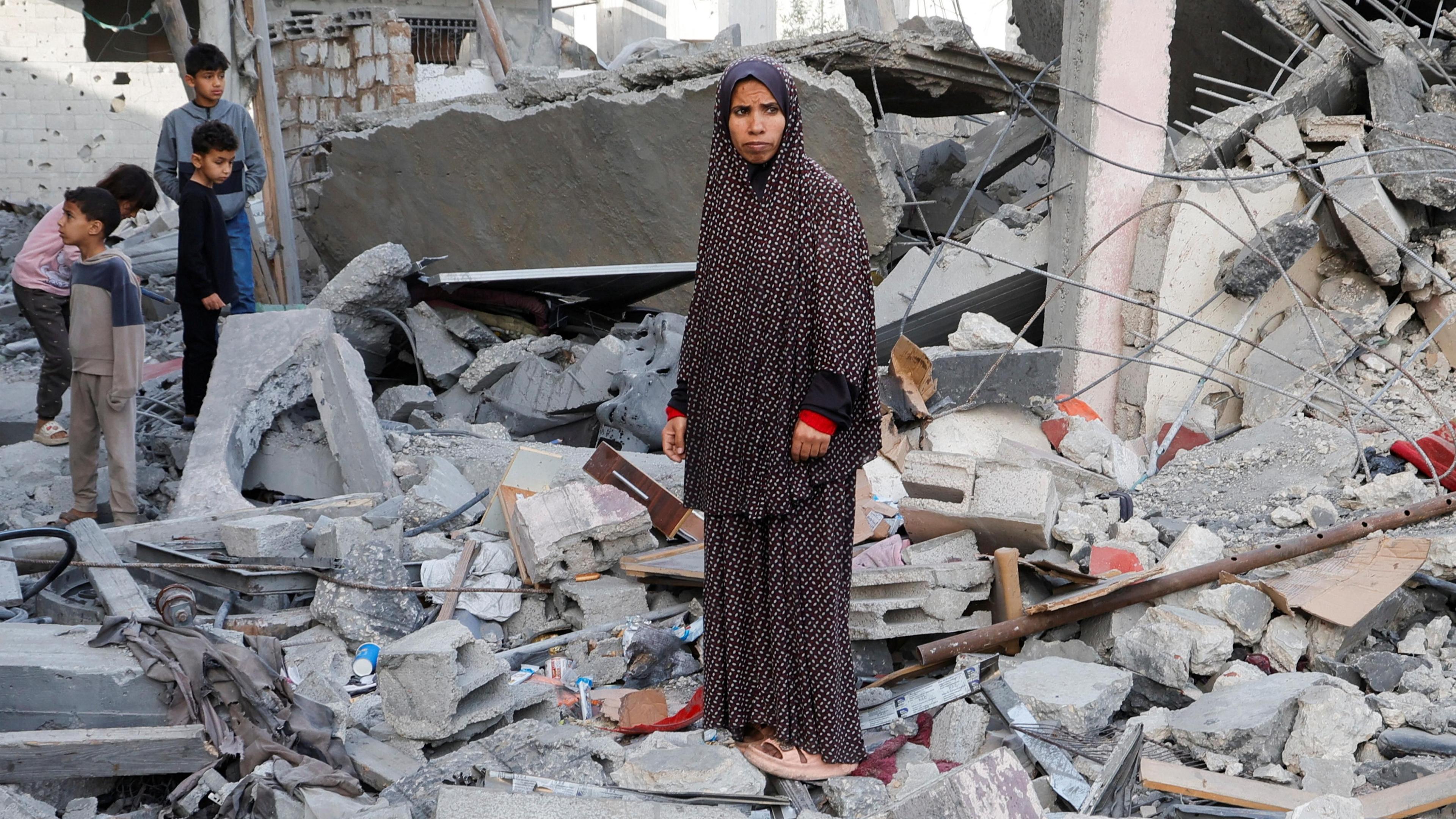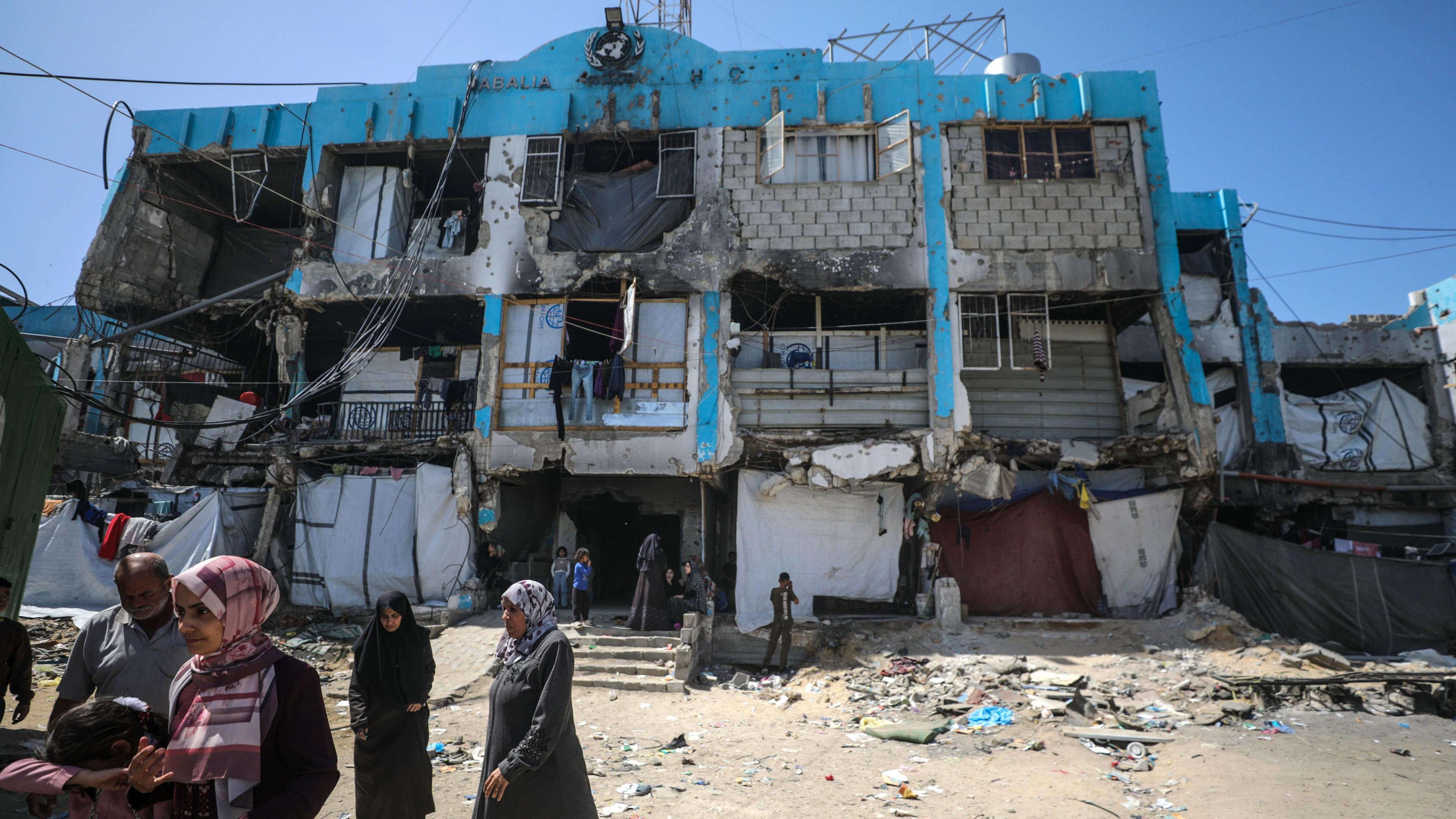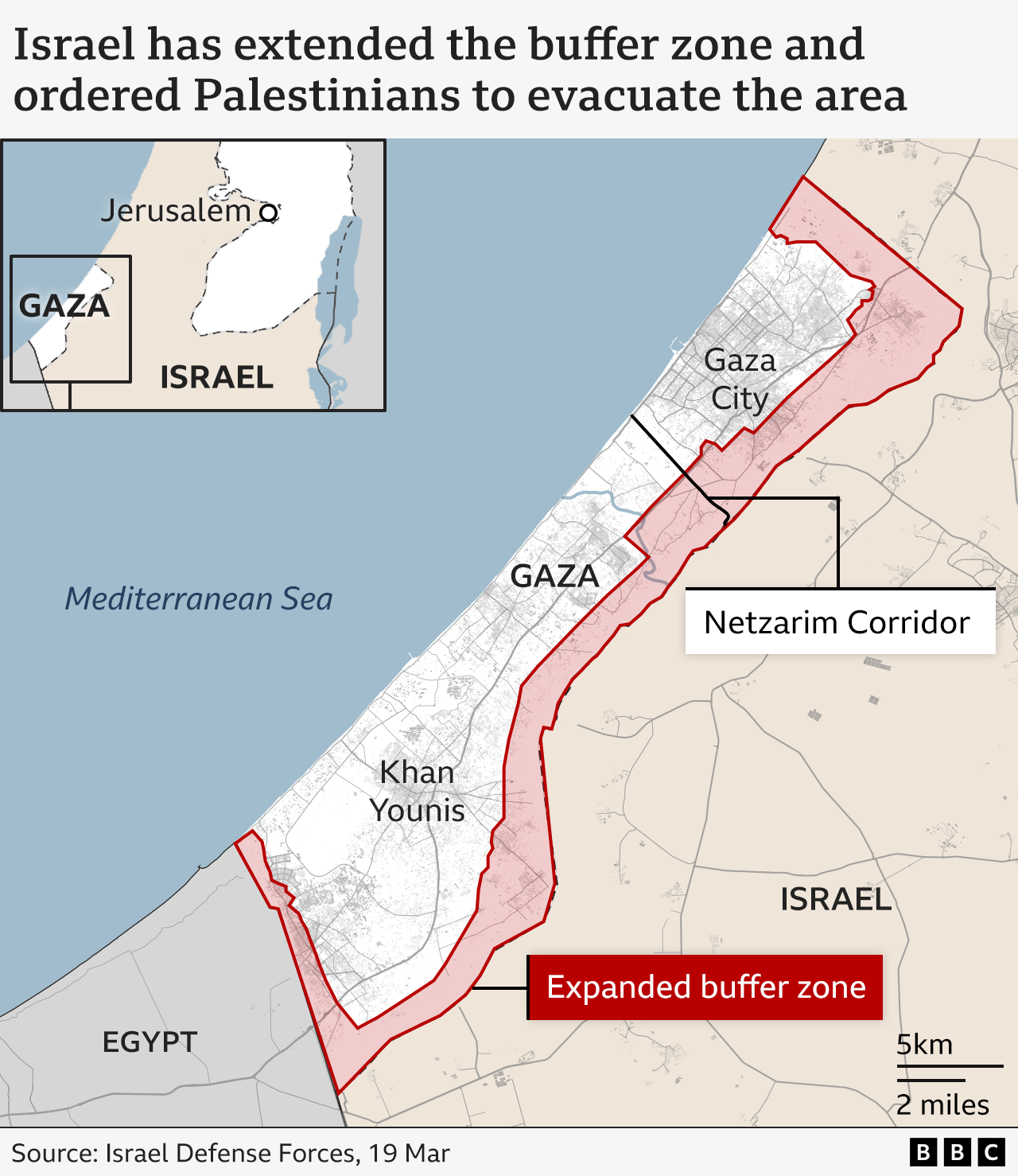Deadly strikes in Gaza as Netanyahu says Israel will seize new military corridor

Twelve people were reportedly killed in an overnight strike on a house in the southern Khan Younis area
- Published
Israel's prime minister has said it is expanding its Gaza offensive and establishing a new military corridor to put pressure on Hamas, as deadly Israeli strikes were reported across the Palestinian territory.
Benjamin Netanyahu said Israeli forces were "seizing the Morag Corridor" - a reference to a former Jewish settlement once located between the southern cities of Rafah and Khan Younis.
Earlier, his defence minister said troops would seize large areas for "security zones".
Meanwhile, 19 Palestinians, including nine children, were killed in an air strike on a UN clinic-turned-shelter in the northern town of Jabalia, a local hospital said. Israel's military said it targeted "Hamas terrorists".
Strikes across Gaza on Tuesday night killed at least 20 people, according to hospitals.
The Hamas-run Civil Defence agency said its first responders recovered the bodies of 12 people, including women and children, from a home in Khan Younis.
Rida al-Jabbour said a neighbour and her three-month-old baby were among the dead.
"From the moment the strike occurred we have not been able to sit or sleep or anything," she told Reuters news agency.
The Israeli military said it was looking into the reports.
There were also reports of extensive bombardment along the border with Egypt overnight.
Survivor challenges Israeli account of attack on Gaza paramedics
- Published2 April
Israel orders evacuation of southern Gaza city of Rafah
- Published31 March
The Civil Defence said the strike in Jabalia on Wednesday morning hit two rooms in a clinic run by the UN agency for Palestinian refugees (Unrwa) which was being used as a shelter.
Video verified by the BBC showed dozens of people and ambulances rushing to the building. Smoke was seen billowing from a wing where two floors appeared to have collapsed.
Unrwa's commissioner-general, Philippe Lazzarini, wrote on X that the building was previously a health centre that it had been heavily damaged earlier in the war.
"Initial reports indicate the facility was sheltering over 700 people when it was hit," he said, adding that a two-week-old baby was reportedly among the dead. "Displaced families stayed at the shelter after it was hit because they have nowhere else to go."
Lazzarini said too many Unrwa premises had reportedly been used for fighting purposes by Palestinian armed groups or Israeli forces, and warned that the "total disregard of UN staff, premises or operations is a profound defiance of international law".
The Israeli military said that it targeted Hamas operatives who were "hiding inside a command and control centre that was being used for co-ordinating terrorist activity and served as a central meeting point".
It said "numerous steps were taken to mitigate the risk of harming civilians, including the use of aerial surveillance and additional intelligence".
Hamas denied that its fighters had been using the building.
Fadel Ashour said he had been at the al-Ahli hospital in Gaza City when some of those wounded by the Jabalia strike were brought there for treatment.
"This shelter is home to many people, and every time the Israeli army bombs it, everyone inside is harmed," he told BBC Arabic's Gaza Lifeline programme.

Unrwa said the building struck in Jabalia was previously a health centre that had been heavily damaged earlier in the war
On Wednesday evening, Israel's prime minister said in a video statement that the IDF had "switched gears" overnight and was "seizing territory, striking the terrorists and destroying the infrastructure".
"We are also doing something else: We are seizing the Morag Corridor. This will be the second Philadelphi, an additional Philadelphi Corridor," Netanyahu added, referring to a strip of territory running along the Egyptian border that the Israeli military seized last May.
Dividing Gaza, he said, would increase pressure on Hamas "step by step" and force the group to hand over the 59 hostages it is still holding in Gaza, 24 of whom are believed to be alive.
"As long as they do not give them to us, the pressure will increase until they do."
Israeli Defence Minister Israel Katz had announced earlier that the military would be expanding its offensive to clear and "seize large areas that will be added to the security zones of the State of Israel", without saying where they would be. He added that it would require a "large-scale" evacuation of Palestinians.
Katz also urged Gazans to act to remove Hamas and free remaining Israeli hostages, without suggesting how they should do so.
The Hostages and Missing Families Forum in Israel, which represents many hostages' relatives, said they were "horrified to wake up" to the news of the expanded military operation. It urged the Israeli government to prioritise securing the release of all the hostages.

This week, Israel's military has ordered an estimated 140,000 people in Rafah to leave their homes and issued new evacuation orders for parts of northern Gaza.
Israel has already significantly expanded a buffer zone around the edge of Gaza over the course of the war, and seized control of a corridor of land cutting through its centre, known as the Netzarim Corridor.
Israel launched its renewed Gaza offensive on 18 March, blaming Hamas for rejecting a new US proposal to extend the ceasefire and free the remaining hostages. Hamas, in turn, accused Israel of violating the original deal they had agreed to in January.
The humanitarian situation across Gaza has dramatically worsened in recent weeks, with Israel refusing to allow aid into the Gaza Strip since 2 March - the longest aid blockage since the war began.
Last month, the UN announced it was reducing its operations in Gaza, one day after eight Palestinian medics, six Civil Defence first responders and a UN staff member were killed by Israeli forces in southern Gaza.
The Israeli military launched a campaign to destroy Hamas in response to an unprecedented cross-border attack on 7 October 2023, in which about 1,200 people were killed and 251 were taken hostage.
At least 50,423 people have been killed in Gaza during the ensuing war, including 1,066 over the past two weeks, according to the Hamas-run health ministry.
Additional reporting by Rachel Hagan in London